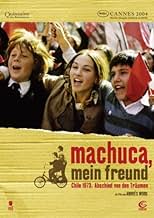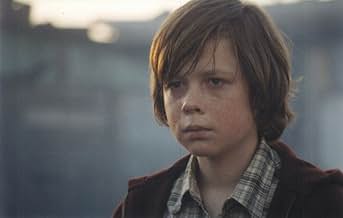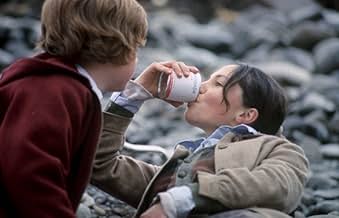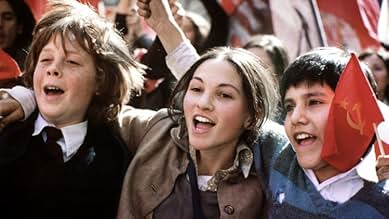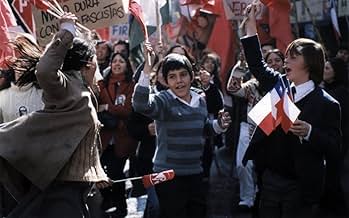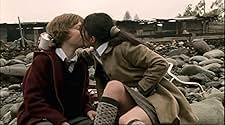CALIFICACIÓN DE IMDb
7.7/10
13 k
TU CALIFICACIÓN
Dos niños chilenos de 12 años de diferentes clases sociales se hacen amigos en 1973. Ambos descubrirán poco a poco el mundo del otro al tiempo que aumentan las tensiones políticas del país.Dos niños chilenos de 12 años de diferentes clases sociales se hacen amigos en 1973. Ambos descubrirán poco a poco el mundo del otro al tiempo que aumentan las tensiones políticas del país.Dos niños chilenos de 12 años de diferentes clases sociales se hacen amigos en 1973. Ambos descubrirán poco a poco el mundo del otro al tiempo que aumentan las tensiones políticas del país.
- Dirección
- Guionistas
- Elenco
- Premios
- 13 premios ganados y 8 nominaciones en total
Aline Küppenheim
- María Luisa Infante
- (as Aline Kuppenheim)
Daniel Alcaíno
- Sargento Ejército
- (as Daniel Alcaino)
Opiniones destacadas
10dsalvat1
This movie tells a tale on the eve of the darkest hour in Chileann history, where two boys of different social background become friends.
This is a very powerful film, especially for Chileanns and many Latin Americans that suffer the prejudice of classicism (the racism of Latin America) and their ideals being beaten away from them.
You will notice many resentments and insults on this message board as the film gets more exposure due to the fact that some people still live in the past.
I hope this film brings everybody together and shows that no matter what race, religion, sexual orientation or social class, children do not discriminate, everybody feels the same emotions.
Hate is learned by the actions of role models.
This is a very powerful film, especially for Chileanns and many Latin Americans that suffer the prejudice of classicism (the racism of Latin America) and their ideals being beaten away from them.
You will notice many resentments and insults on this message board as the film gets more exposure due to the fact that some people still live in the past.
I hope this film brings everybody together and shows that no matter what race, religion, sexual orientation or social class, children do not discriminate, everybody feels the same emotions.
Hate is learned by the actions of role models.
In 1973, the Chilean military, under the direction of General Augusto Pinochet and backed by the CIA, overthrew the shaky socialist government of democratically elected President Salvador Allende. The coup led to the murder of 3,000 leftist Allende supporters and the detention of an estimated 250,000 political prisoners. Set against the background of the political instability that led to the crisis, Andrés Woods' Machuca is the moving story of the friendship between two boys from different sides of the social spectrum. Voted the most popular film at the 2004 Vancouver Film Festival and a major box-office hit in Chile, the semi-autobiographical film succeeds on both a human and a political level, the different elements coming together in a final conflagration.
Gonzalo Infante (Matias Quer) is a chubby, red-faced 11-year old who attends St. Patrick's private school. He lives in a wealthy neighborhood where his security is unquestioned, even though he knows that his mother Maria (Aline Kuppenheim) is having a long-standing affair with a well-to-do Argentine businessman. Gonzalo is shy and inexpressive and is often bullied at school. His life changes, however, when Father McEnroe (Ernesto Malbran), the priest who runs the school, opens St. Patrick's to those who are unable to pay, and Gonzalo develops a friendship with Pedro Machuca (Ariel Mataluna), a youngster who lives in a nearby shantytown. The inclusion of the marginal students causes unrest at the school. Fights break out between the two economic classes and parents hastily call meetings to voice their opposition to the "communist" priest. Gonzalo protects Pedro from the bullies and later visits Pedro in his home.
Aware of how much he has, Gonzalo accepts his status without feeling superior, though Pedro's family refers to him as "the snob". In a subplot, Pedro's seductive young cousin Silvana (Manuela Martelli) gives both boys an introduction to sexual pleasure. Though the relationship between the two boys develops naturally and their innocence allows them to see past the developing turmoil, the disturbing layers of adult events slowly begin to threaten their friendship. To pick up some extra money, the boys attend political rallies and sell Chilean flags to both the Nationalists and the Communists, but soon emotions escalate and street fights break out between far-left and far-right militants. The onset of revolt is signaled by the arrival of two jets flying towards the Presidential Palace, a seminal event in Chile's history that marked the end of their democracy.
One of Chile's most successful young filmmakers, Woods lets the facts speak for themselves, and Machuca makes its points with an emotional power unencumbered by bias or simplistic messages. While the upper middle class is shown as elitist and disdainful of the working class, Pedro's family is also not portrayed in glowing terms. In a drunken rage of victimization, the father tells his son that in a few years, "He (Gonzalo) will be working for Daddy....You'll be cleaning toilets." The children are portrayed as simply children without the false glow of larger-than-life heroism. Although Machuca may ultimately have more of an impact for Chileans who experienced the coup directly, its theme of young people caught in the swirl of events beyond their understanding resonates far beyond the details of this single tragic moment in history.
Gonzalo Infante (Matias Quer) is a chubby, red-faced 11-year old who attends St. Patrick's private school. He lives in a wealthy neighborhood where his security is unquestioned, even though he knows that his mother Maria (Aline Kuppenheim) is having a long-standing affair with a well-to-do Argentine businessman. Gonzalo is shy and inexpressive and is often bullied at school. His life changes, however, when Father McEnroe (Ernesto Malbran), the priest who runs the school, opens St. Patrick's to those who are unable to pay, and Gonzalo develops a friendship with Pedro Machuca (Ariel Mataluna), a youngster who lives in a nearby shantytown. The inclusion of the marginal students causes unrest at the school. Fights break out between the two economic classes and parents hastily call meetings to voice their opposition to the "communist" priest. Gonzalo protects Pedro from the bullies and later visits Pedro in his home.
Aware of how much he has, Gonzalo accepts his status without feeling superior, though Pedro's family refers to him as "the snob". In a subplot, Pedro's seductive young cousin Silvana (Manuela Martelli) gives both boys an introduction to sexual pleasure. Though the relationship between the two boys develops naturally and their innocence allows them to see past the developing turmoil, the disturbing layers of adult events slowly begin to threaten their friendship. To pick up some extra money, the boys attend political rallies and sell Chilean flags to both the Nationalists and the Communists, but soon emotions escalate and street fights break out between far-left and far-right militants. The onset of revolt is signaled by the arrival of two jets flying towards the Presidential Palace, a seminal event in Chile's history that marked the end of their democracy.
One of Chile's most successful young filmmakers, Woods lets the facts speak for themselves, and Machuca makes its points with an emotional power unencumbered by bias or simplistic messages. While the upper middle class is shown as elitist and disdainful of the working class, Pedro's family is also not portrayed in glowing terms. In a drunken rage of victimization, the father tells his son that in a few years, "He (Gonzalo) will be working for Daddy....You'll be cleaning toilets." The children are portrayed as simply children without the false glow of larger-than-life heroism. Although Machuca may ultimately have more of an impact for Chileans who experienced the coup directly, its theme of young people caught in the swirl of events beyond their understanding resonates far beyond the details of this single tragic moment in history.
I watched the film with my mother, who lived through the coup d'etat in Chile. The events depicted in the movie were so realistic, they transported her back to that era. She cried as we watched and explained all of the small details I wouldn't have gotten being someone who didn't experience these events for myself. With this in mind, I have to think this movie was meant to be watched by a Chilean audience to be fully understood and "felt". Someone like my mother, who has seen the atrocities that occurred in Chile in the mid-seventies, would be a more appropriate critic of this film.
Regardless, I think everyone should watch this movie. It is a touching story about friendship, growing up, social classes, and politics. The acting was exceptional. The plot was well- written. The sets, props, and costumes were accurate. It has a lot to offer as an enlightening and educational film since the story of Chile's own 9/11 has not yet reached the general masses. Because the story is told through a sentimental child's perspective, you are drawn yet closer to the characters and their emotions. Some have criticized this film harshly, stating that Wood couldn't make up his mind whether this film is a political story or a child's coming-of-age tale. Why can't it be both?
As a Chilean, I am extremely proud of this film, in its quality and accuracy. It is powerful, bold and touched me to my very core. I strongly recommend it to all, especially all of you Chilean-Americans born during this era. Ask your parents to tell you their own story, and you will see that Machuca is more than a piece of cinematic brilliance and a milestone in Chilean film. It is a film you will never forget.
Regardless, I think everyone should watch this movie. It is a touching story about friendship, growing up, social classes, and politics. The acting was exceptional. The plot was well- written. The sets, props, and costumes were accurate. It has a lot to offer as an enlightening and educational film since the story of Chile's own 9/11 has not yet reached the general masses. Because the story is told through a sentimental child's perspective, you are drawn yet closer to the characters and their emotions. Some have criticized this film harshly, stating that Wood couldn't make up his mind whether this film is a political story or a child's coming-of-age tale. Why can't it be both?
As a Chilean, I am extremely proud of this film, in its quality and accuracy. It is powerful, bold and touched me to my very core. I strongly recommend it to all, especially all of you Chilean-Americans born during this era. Ask your parents to tell you their own story, and you will see that Machuca is more than a piece of cinematic brilliance and a milestone in Chilean film. It is a film you will never forget.
In 1973, in Santiago of Chile of the first socialist president democratically elected in a Latin-American country, President Salvador Allende, the principal of the Saint Patrick School, Father McEnroe (Ernesto Malbran) makes a trial of integration between students of the upper and lower classes. The bourgeois boy Gonzalo Infante (Matías Quer) and the boy from the slum Pedro Machuca (Ariel Mateluna) become great friends, while the conflicts on the streets leads Chile to the bloody and repressive military coup of General Augusto Pinochet on 11 September 1973, changing definitely their lives, their relationship and their country.
"Machuca" is a touching and realistic tale of friendship and coming to age in times of military coup in Chile. The Chilean director Andrés Wood made this fantastic movie following the political genre of Costa Gravas, but with a subtle drama with two children getting conscience of the fight of classes and the changes in their country by force and violence. The story in some moments seems to be a documentary so perfect the direction and acting are. The debut of the two lead actors, Matías Quer and Ariel Mateluna, is awesome: the eyes of the silent Matías Quer disclosing reality and the facial expression of Ariel Mateluna are amazing. "Machuca" is a highly recommended movie, and for the younger generations slightly see what happened in the 70's in South America and particularly in Chile. A few figures about Pinochet's dictatorship: 30,000 Chileans were killed; 100,000 Chileans were arrested without a trial; 22,000 students were expelled from the universities; 150,000 Chileans were exiled. My vote is ten.
Title (Brazil): "Machuca"
"Machuca" is a touching and realistic tale of friendship and coming to age in times of military coup in Chile. The Chilean director Andrés Wood made this fantastic movie following the political genre of Costa Gravas, but with a subtle drama with two children getting conscience of the fight of classes and the changes in their country by force and violence. The story in some moments seems to be a documentary so perfect the direction and acting are. The debut of the two lead actors, Matías Quer and Ariel Mateluna, is awesome: the eyes of the silent Matías Quer disclosing reality and the facial expression of Ariel Mateluna are amazing. "Machuca" is a highly recommended movie, and for the younger generations slightly see what happened in the 70's in South America and particularly in Chile. A few figures about Pinochet's dictatorship: 30,000 Chileans were killed; 100,000 Chileans were arrested without a trial; 22,000 students were expelled from the universities; 150,000 Chileans were exiled. My vote is ten.
Title (Brazil): "Machuca"
I live in Chile, where the movie happens. I have also followed Andres Wood in his career as a Director and I must say that this is his most mature, rounded and strong piece of work.
The Movie is centered in the social phenomena that happened in the last days before the Coup in 1973. Now the movie is incredibly accurate from the Costume Design, the Cars's License Plates, the expressions, the product brands and graffitis, to the social polarization, violence and killings. As remarkable as the Production is the honesty of the director, who could have easily fall into contaminating his movie with political propaganda, instead he kept delightfully accurate.
Even though for those who knows the history, the devastating feeling is all around, the movie centers in the social experiment led by a priest who was the principal of a high class school, who takes into the school some poor mestizo children.
Machuca is one of this children's who begins a friendship with a white rich children.
The story itself works as a metaphor for the innocence of the people in that time. innocence that was lost over and over.
The Movie is centered in the social phenomena that happened in the last days before the Coup in 1973. Now the movie is incredibly accurate from the Costume Design, the Cars's License Plates, the expressions, the product brands and graffitis, to the social polarization, violence and killings. As remarkable as the Production is the honesty of the director, who could have easily fall into contaminating his movie with political propaganda, instead he kept delightfully accurate.
Even though for those who knows the history, the devastating feeling is all around, the movie centers in the social experiment led by a priest who was the principal of a high class school, who takes into the school some poor mestizo children.
Machuca is one of this children's who begins a friendship with a white rich children.
The story itself works as a metaphor for the innocence of the people in that time. innocence that was lost over and over.
¿Sabías que…?
- TriviaAs stated by the director in several interviews, the movie was shot only on Sundays, due to its small budget.
- ErroresSilvana is standing by the outhouse, then moments later, after camera pans, appears on the other side of Gonzalo.
- Citas
Patricio Infante: Socialism might be better for Chile but not for us.
- Créditos curiososIn the credits at the beginning of the film, the last letter of each word drifts slowly to the right separating from the names
- ConexionesFeatured in Sin maquillaje: Tamara Acosta (2013)
- Bandas sonorasAi Amor
Written and performed by Buddy Richard
Selecciones populares
Inicia sesión para calificar y agrega a la lista de videos para obtener recomendaciones personalizadas
- How long is Machuca?Con tecnología de Alexa
Detalles
- Fecha de lanzamiento
- Países de origen
- Sitio oficial
- Idiomas
- También se conoce como
- Мачука
- Locaciones de filmación
- Productoras
- Ver más créditos de la compañía en IMDbPro
Taquilla
- Presupuesto
- USD 1,500,000 (estimado)
- Total en EE. UU. y Canadá
- USD 26,676
- Fin de semana de estreno en EE. UU. y Canadá
- USD 4,635
- 23 ene 2005
- Total a nivel mundial
- USD 3,187,700
- Tiempo de ejecución1 hora 56 minutos
- Color
- Mezcla de sonido
- Relación de aspecto
- 1.85 : 1
Contribuir a esta página
Sugiere una edición o agrega el contenido que falta

Principales brechas de datos
By what name was Machuca (2004) officially released in India in English?
Responda

